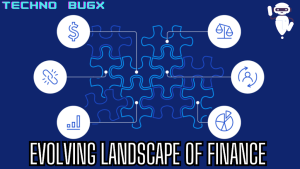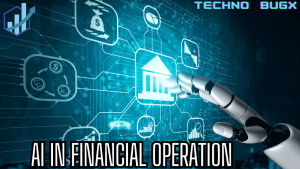Unleashing AI Financial Wizardry: Revolutionizing Finance

AI Intelligence for Finance is not simply a popular expression, a groundbreaking power is reshaping the monetary business, as far as we might be concerned. In a world driven by data and automation, the marriage of AI and finance has become more than just a technological advancement.
In this article, we will research the spellbinding space of Modernized thinking in Cash, its credible setting, its continuous impact, and the mind blowing potential it holds for what the future holds.
Table of Contents
AI Transforms Financial Operations
Advantages of AI in Finance
Challenges and Concerns
Future Trends and Innovations
Conclusion
Evolving Landscape of Finance
Historical Context of AI in Finance
Artificial Intelligence consciousness has been a piece of money for a long time, yet it picked up huge speed as of late. At first, AI intelligence was utilized for algorithmic exchanging and risk evaluation.
After some time, its job extended to include a more extensive scope of monetary exercises. Today, AI consciousness’ presence is felt in everything from robot advisers for distortion areas.
The Current State of AI Adoption
The monetary business is seeing a flood in simulated intelligence reception. Venture companies use AI calculations to break down market information and execute high-recurrence exchanges.
Banks utilize artificial intelligence controlled Chabot’s to give ongoing client assistance. Guarantors influence prescient investigation to precisely survey gambles. The continuous scene is a show of reenacted knowledge’s adaptability in finance.
Key Players and Impact
- Tech goliaths, new businesses, and customary monetary establishments are putting vigorously in simulated intelligence.
- Organizations like IBM, Google, and fetch new businesses are creating state of the art computer based intelligence arrangements.
- Administrative bodies like the SEC are adjusting to simulated intelligence’s developing impact.
- Simulated intelligence specialists and information researchers are becoming sought-after experts in the monetary area.
AI Transforms in Financial Operations
Algorithmic Trading and Market Predictions
Computer based intelligence succeeds in dissecting tremendous measures of market information at speeds impossible for people. AI calculations recognize exchanging designs and execute exchanges with accuracy. Clever assessment gives snippets of data into market plans, assisting money related allies with settling on informed choices.
Risk Assessment and Management
Conventional strategies for risk appraisal are in many cases tedious and mistake inclined. AI-powered systems can analyze customer data and payment histories to determine creditworthiness instantly. AI models can hail expected false exchanges progressively, saving establishments billions of dollars.
Customer Experience and Personalization
AI intelligence has reformed client care in finance. Chabot’s give day in and day out help, noting questions and helping with exchanges. Simulated intelligence driven personalization tailors monetary items and administrations to individual client needs, improving the general client experience.
Real-World Examples
- Success Stories of AI Adoption
- Hedge funds using AI for portfolio management
- Banks improving customer satisfaction through AI
Success Stories of AI Adoption
A few monetary establishments have embraced AI intelligence effectively. Shared reserves are using mimicked insight to supervise portfolios, achieving extraordinary returns. Banks are sending mimicked knowledge to streamline processes, reducing practical costs while further developing shopper reliability.
Case Studies Demonstrating ROI
Contextual investigations from different monetary associations exhibit the substantial profit from venture AI intelligence brings. These integrate predominant efficiency, extended precision, decreased possibility, and better client upkeep. AI brainpower’s impact is quantifiable and critical.
Advantages of AI in Finance
Decision-Making
Artificial intelligence gives information driven bits of knowledge, empowering better navigation. Monetary experts can use computer-based intelligence to recognize beneficial speculation, open doors, enhance portfolios, and oversee gambles actually.
Efficiency and Cost Savings
Computerization through simulated intelligence diminishes difficult work, bringing down functional expenses. Errands that once required hours or days can now be finished in a flash. This proficiency converts into critical reserve funds for monetary foundations.
Risk Moderation
AI intelligence’s capacity to break down information continuously recognizes and relieves gambles instantly. Whether it is recognizing fake exercises or evaluating market instability, simulated intelligence adds to a safer monetary scene.
Improved Customer Support
AI intelligence driven Chabot’s and remote helpers offer prompt client service. This availability improves consumer loyalty and devotion, significant variables in the cutthroat monetary area.
Challenges and Concerns
- Data Security and Privacy
- Regulatory Compliance
- Ethical Considerations
- Job Displacement and Workforce Changes
Data Security and Privacy
The expanded utilization of artificial intelligence in finance raises worries about information security and protection. Shielding delicate monetary data from digital dangers is central.
Regulatory Compliance
Monetary establishments should explore an overwhelming snare of guidelines. Guaranteeing that simulated intelligence applications consent to these guidelines is a test that requires cautious consideration.
Ethical Considerations
The moral utilization of simulated intelligence, particularly in regions like credit scoring and loaning, is a subject of discussion. Guaranteeing decency and straightforwardness in artificial intelligence driven choices is a basic concern.
Job Displacement and Workforce Changes
As AI automates routine tasks, there are concerns about job displacement. However, AI also creates new roles, emphasizing the importance of upskilling and adaptability.

Future Trends and Innovations
Quantum Processing in Finance
Quantum handling might potentially change financial calculations, enabling faster and more muddled examinations. It might reshape risk appraisal, portfolio advancement, and cryptography.
Regulatory Compliance
AI Intelligence controlled structures can help financial associations in investigating complex authoritative circumstances, diminishing consistency costs while ensuring adherence to guidelines and rules.
Role of AI in Sustainable Finance
AI can play a significant role in sustainable finance by analyzing ESG (Environmental, Social, and Governance) data, helping investors make ethical and environmentally responsible choices.
Conclusion
With everything taken into account, computer based intelligence and mental ability is not just a gadget yet a primary driving force in the financial business. Its actual limit with respect to overhauling bearing, further creating efficiency, and it is apparent to change client experiences.
While challenges exist, the monetary world’s future without a doubt includes a noticeable job for AI intelligence. As innovation keeps on developing, the monetary scene will advance with it, setting out new open doors and difficulties for the business.



Leave a Comment